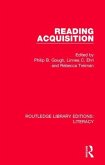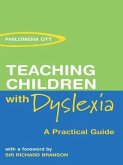Foundations of Reading Acquisition and Dyslexia
Implications for Early Intervention
Herausgeber: Blachman, Benita A.
Foundations of Reading Acquisition and Dyslexia
Implications for Early Intervention
Herausgeber: Blachman, Benita A.
- Gebundenes Buch
- Merkliste
- Auf die Merkliste
- Bewerten Bewerten
- Teilen
- Produkt teilen
- Produkterinnerung
- Produkterinnerung
A volume based on presentations made at a conference on "Cognitive and Linguistic Foundations of Reading Acquisition: Implications for Intervention Research". There are four sections: theoretical foundations, subtypes of dyslexia, beginning to read and spell, and implications for intervention.
The aim of the book is to demonstrate what the research shows of how children learn to read, especially of the role of phonology awareness in learning to read & how interventions may best work with those who have incomplete phonological awareness.
Andere Kunden interessierten sich auch für
![Reading Acquisition Reading Acquisition]() Reading Acquisition168,99 €
Reading Acquisition168,99 €![Spelling, Handwriting and Dyslexia Spelling, Handwriting and Dyslexia]() Diane MontgomerySpelling, Handwriting and Dyslexia214,99 €
Diane MontgomerySpelling, Handwriting and Dyslexia214,99 €![Dyslexia-friendly Strategies for Reading, Spelling and Handwriting Dyslexia-friendly Strategies for Reading, Spelling and Handwriting]() Diane MontgomeryDyslexia-friendly Strategies for Reading, Spelling and Handwriting131,99 €
Diane MontgomeryDyslexia-friendly Strategies for Reading, Spelling and Handwriting131,99 €![Teaching Children with Dyslexia Teaching Children with Dyslexia]() Philomena OttTeaching Children with Dyslexia148,99 €
Philomena OttTeaching Children with Dyslexia148,99 €![Dyslexia and Mathematics Dyslexia and Mathematics]() Tim Miles / Elaine Miles (eds.)Dyslexia and Mathematics224,99 €
Tim Miles / Elaine Miles (eds.)Dyslexia and Mathematics224,99 €![The Routledge Companion to Dyslexia The Routledge Companion to Dyslexia]() The Routledge Companion to Dyslexia265,99 €
The Routledge Companion to Dyslexia265,99 €![Dyslexia at College Dyslexia at College]() T. R. MilesDyslexia at College178,99 €
T. R. MilesDyslexia at College178,99 €-
-
-
A volume based on presentations made at a conference on "Cognitive and Linguistic Foundations of Reading Acquisition: Implications for Intervention Research". There are four sections: theoretical foundations, subtypes of dyslexia, beginning to read and spell, and implications for intervention.
The aim of the book is to demonstrate what the research shows of how children learn to read, especially of the role of phonology awareness in learning to read & how interventions may best work with those who have incomplete phonological awareness.
The aim of the book is to demonstrate what the research shows of how children learn to read, especially of the role of phonology awareness in learning to read & how interventions may best work with those who have incomplete phonological awareness.
Produktdetails
- Produktdetails
- Verlag: Routledge
- Seitenzahl: 486
- Erscheinungstermin: 1. August 1997
- Englisch
- Abmessung: 235mm x 157mm x 31mm
- Gewicht: 848g
- ISBN-13: 9780805823622
- ISBN-10: 080582362X
- Artikelnr.: 33396023
- Herstellerkennzeichnung
- Libri GmbH
- Europaallee 1
- 36244 Bad Hersfeld
- gpsr@libri.de
- Verlag: Routledge
- Seitenzahl: 486
- Erscheinungstermin: 1. August 1997
- Englisch
- Abmessung: 235mm x 157mm x 31mm
- Gewicht: 848g
- ISBN-13: 9780805823622
- ISBN-10: 080582362X
- Artikelnr.: 33396023
- Herstellerkennzeichnung
- Libri GmbH
- Europaallee 1
- 36244 Bad Hersfeld
- gpsr@libri.de
Benita A. Blachman
Contents: Preface. Acknowledgments. List of Contributors. Part I: Theoretical Foundations.A.M. Liberman
How Theories of Speech Affect Research in Reading and Writing. S.A. Brady
Ability to Encode Phonological Representations: An Underlying Difficulty of Poor Readers. P. Tallal
S.L. Miller
W.M. Jenkins
M.M. Merzenich
The Role of Temporal Processing in Developmental Language-Based Learning Disorders: Research and Clinical Implications. M. Wolf
A Provisional
Integrative Account of Phonological and Naming-Speed Deficits in Dyslexia: Implications for Diagnosis and Intervention. Part II: Subtypes of Dyslexia.J.M. Fletcher
R. Morris
G.R. Lyon
K.K. Stuebing
S.E. Shaywitz
D.P. Shankweiler
L. Katz
B.A. Shaywitz
Subtypes of Dyslexia: An Old Problem Revisited. K.E. Stanovich
L.S. Siegel
A. Gottardo
P. Chiappe
R. Sidhu
Subtypes of Developmental Dyslexia: Differences in Phonological and Orthographic Coding. Part III: Beginning to Read and Spell.M. Bruck
F. Genesee
M. Caravolas
A Cross-Linguistic Study of Early Literacy Acquisition. L.C. Ehri
Sight Word Learning in Normal Readers and Dyslexics. R. Treiman
Spelling in Normal Children and Dyslexics. P.E. Bryant
T. Nunes
M. Bindman
Children's Understanding of the Connection Between Grammar and Spelling. Part IV: Implications for Intervention.B.R. Foorman
D.J. Francis
S.E. Shaywitz
B.A. Shaywitz
J.M. Fletcher
The Case for Early Reading Intervention. B. Byrne
R. Fielding-Barnsley
L. Ashley
K. Larsen
Assessing the Child's and the Environment's Contribution to Reading Acquisition: What We Know and What We Don't Know. J.K. Torgesen
R.K. Wagner
C.A. Rashotte
Approaches to the Prevention and Remediation of Phonologically-Based Reading Disabilities. R.K. Olson
B. Wise
M.C. Johnson
J. Ring
The Etiology and Remediation of Phonologically Based Word Recognition and Spelling Disabilities: Are Phonological Deficits the "Hole" Story? K.T. Greaney
W.E. Tunmer
J.W. Chapman
The Use of Rime-Based Orthographic Analogy Training as an Intervention Strategy for Reading-Disabled Children. F.R. Vellutino
D.M. Scanlon
E.R. Sipay
Toward Distinguishing Between Cognitive and Experiential Deficits as Primary Sources of Difficulty in Learning to Read: The Importance of Early Intervention in Diagnosing a Specific Reading Disability. T. Nicholson
Closing the Gap on Reading Failure: Social Background
Phonemic Awareness
and Learning to Read. B.A. Blachman
Early Intervention and Phonological Awareness: A Cautionary Tale.
How Theories of Speech Affect Research in Reading and Writing. S.A. Brady
Ability to Encode Phonological Representations: An Underlying Difficulty of Poor Readers. P. Tallal
S.L. Miller
W.M. Jenkins
M.M. Merzenich
The Role of Temporal Processing in Developmental Language-Based Learning Disorders: Research and Clinical Implications. M. Wolf
A Provisional
Integrative Account of Phonological and Naming-Speed Deficits in Dyslexia: Implications for Diagnosis and Intervention. Part II: Subtypes of Dyslexia.J.M. Fletcher
R. Morris
G.R. Lyon
K.K. Stuebing
S.E. Shaywitz
D.P. Shankweiler
L. Katz
B.A. Shaywitz
Subtypes of Dyslexia: An Old Problem Revisited. K.E. Stanovich
L.S. Siegel
A. Gottardo
P. Chiappe
R. Sidhu
Subtypes of Developmental Dyslexia: Differences in Phonological and Orthographic Coding. Part III: Beginning to Read and Spell.M. Bruck
F. Genesee
M. Caravolas
A Cross-Linguistic Study of Early Literacy Acquisition. L.C. Ehri
Sight Word Learning in Normal Readers and Dyslexics. R. Treiman
Spelling in Normal Children and Dyslexics. P.E. Bryant
T. Nunes
M. Bindman
Children's Understanding of the Connection Between Grammar and Spelling. Part IV: Implications for Intervention.B.R. Foorman
D.J. Francis
S.E. Shaywitz
B.A. Shaywitz
J.M. Fletcher
The Case for Early Reading Intervention. B. Byrne
R. Fielding-Barnsley
L. Ashley
K. Larsen
Assessing the Child's and the Environment's Contribution to Reading Acquisition: What We Know and What We Don't Know. J.K. Torgesen
R.K. Wagner
C.A. Rashotte
Approaches to the Prevention and Remediation of Phonologically-Based Reading Disabilities. R.K. Olson
B. Wise
M.C. Johnson
J. Ring
The Etiology and Remediation of Phonologically Based Word Recognition and Spelling Disabilities: Are Phonological Deficits the "Hole" Story? K.T. Greaney
W.E. Tunmer
J.W. Chapman
The Use of Rime-Based Orthographic Analogy Training as an Intervention Strategy for Reading-Disabled Children. F.R. Vellutino
D.M. Scanlon
E.R. Sipay
Toward Distinguishing Between Cognitive and Experiential Deficits as Primary Sources of Difficulty in Learning to Read: The Importance of Early Intervention in Diagnosing a Specific Reading Disability. T. Nicholson
Closing the Gap on Reading Failure: Social Background
Phonemic Awareness
and Learning to Read. B.A. Blachman
Early Intervention and Phonological Awareness: A Cautionary Tale.
Contents: Preface. Acknowledgments. List of Contributors. Part I: Theoretical Foundations.A.M. Liberman
How Theories of Speech Affect Research in Reading and Writing. S.A. Brady
Ability to Encode Phonological Representations: An Underlying Difficulty of Poor Readers. P. Tallal
S.L. Miller
W.M. Jenkins
M.M. Merzenich
The Role of Temporal Processing in Developmental Language-Based Learning Disorders: Research and Clinical Implications. M. Wolf
A Provisional
Integrative Account of Phonological and Naming-Speed Deficits in Dyslexia: Implications for Diagnosis and Intervention. Part II: Subtypes of Dyslexia.J.M. Fletcher
R. Morris
G.R. Lyon
K.K. Stuebing
S.E. Shaywitz
D.P. Shankweiler
L. Katz
B.A. Shaywitz
Subtypes of Dyslexia: An Old Problem Revisited. K.E. Stanovich
L.S. Siegel
A. Gottardo
P. Chiappe
R. Sidhu
Subtypes of Developmental Dyslexia: Differences in Phonological and Orthographic Coding. Part III: Beginning to Read and Spell.M. Bruck
F. Genesee
M. Caravolas
A Cross-Linguistic Study of Early Literacy Acquisition. L.C. Ehri
Sight Word Learning in Normal Readers and Dyslexics. R. Treiman
Spelling in Normal Children and Dyslexics. P.E. Bryant
T. Nunes
M. Bindman
Children's Understanding of the Connection Between Grammar and Spelling. Part IV: Implications for Intervention.B.R. Foorman
D.J. Francis
S.E. Shaywitz
B.A. Shaywitz
J.M. Fletcher
The Case for Early Reading Intervention. B. Byrne
R. Fielding-Barnsley
L. Ashley
K. Larsen
Assessing the Child's and the Environment's Contribution to Reading Acquisition: What We Know and What We Don't Know. J.K. Torgesen
R.K. Wagner
C.A. Rashotte
Approaches to the Prevention and Remediation of Phonologically-Based Reading Disabilities. R.K. Olson
B. Wise
M.C. Johnson
J. Ring
The Etiology and Remediation of Phonologically Based Word Recognition and Spelling Disabilities: Are Phonological Deficits the "Hole" Story? K.T. Greaney
W.E. Tunmer
J.W. Chapman
The Use of Rime-Based Orthographic Analogy Training as an Intervention Strategy for Reading-Disabled Children. F.R. Vellutino
D.M. Scanlon
E.R. Sipay
Toward Distinguishing Between Cognitive and Experiential Deficits as Primary Sources of Difficulty in Learning to Read: The Importance of Early Intervention in Diagnosing a Specific Reading Disability. T. Nicholson
Closing the Gap on Reading Failure: Social Background
Phonemic Awareness
and Learning to Read. B.A. Blachman
Early Intervention and Phonological Awareness: A Cautionary Tale.
How Theories of Speech Affect Research in Reading and Writing. S.A. Brady
Ability to Encode Phonological Representations: An Underlying Difficulty of Poor Readers. P. Tallal
S.L. Miller
W.M. Jenkins
M.M. Merzenich
The Role of Temporal Processing in Developmental Language-Based Learning Disorders: Research and Clinical Implications. M. Wolf
A Provisional
Integrative Account of Phonological and Naming-Speed Deficits in Dyslexia: Implications for Diagnosis and Intervention. Part II: Subtypes of Dyslexia.J.M. Fletcher
R. Morris
G.R. Lyon
K.K. Stuebing
S.E. Shaywitz
D.P. Shankweiler
L. Katz
B.A. Shaywitz
Subtypes of Dyslexia: An Old Problem Revisited. K.E. Stanovich
L.S. Siegel
A. Gottardo
P. Chiappe
R. Sidhu
Subtypes of Developmental Dyslexia: Differences in Phonological and Orthographic Coding. Part III: Beginning to Read and Spell.M. Bruck
F. Genesee
M. Caravolas
A Cross-Linguistic Study of Early Literacy Acquisition. L.C. Ehri
Sight Word Learning in Normal Readers and Dyslexics. R. Treiman
Spelling in Normal Children and Dyslexics. P.E. Bryant
T. Nunes
M. Bindman
Children's Understanding of the Connection Between Grammar and Spelling. Part IV: Implications for Intervention.B.R. Foorman
D.J. Francis
S.E. Shaywitz
B.A. Shaywitz
J.M. Fletcher
The Case for Early Reading Intervention. B. Byrne
R. Fielding-Barnsley
L. Ashley
K. Larsen
Assessing the Child's and the Environment's Contribution to Reading Acquisition: What We Know and What We Don't Know. J.K. Torgesen
R.K. Wagner
C.A. Rashotte
Approaches to the Prevention and Remediation of Phonologically-Based Reading Disabilities. R.K. Olson
B. Wise
M.C. Johnson
J. Ring
The Etiology and Remediation of Phonologically Based Word Recognition and Spelling Disabilities: Are Phonological Deficits the "Hole" Story? K.T. Greaney
W.E. Tunmer
J.W. Chapman
The Use of Rime-Based Orthographic Analogy Training as an Intervention Strategy for Reading-Disabled Children. F.R. Vellutino
D.M. Scanlon
E.R. Sipay
Toward Distinguishing Between Cognitive and Experiential Deficits as Primary Sources of Difficulty in Learning to Read: The Importance of Early Intervention in Diagnosing a Specific Reading Disability. T. Nicholson
Closing the Gap on Reading Failure: Social Background
Phonemic Awareness
and Learning to Read. B.A. Blachman
Early Intervention and Phonological Awareness: A Cautionary Tale.








